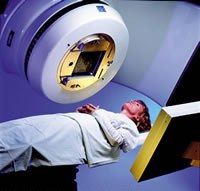Women with early-stage breast tumors can undergo shorter course of radiation
Women with early-stage breast tumors can undergo a shorter course of radiation without a greater risk that their cancer will come back years later.

The results are good news for women who must quit work or travel far to receive the five-week, daily treatments usually given.
"This is very disruptive to your life. If we could achieve the same outcome with less frequent visits to the radiation center ... this would be a tremendous benefit," said Dr. Julie Gralow of the Fred Hutchinson Cancer Center in Seattle.
Gralow was not involved in the study, but reviewed and discussed it at a meeting Sunday of the American Society of Clinical Oncology.
Most of the 180,000 breast cancers diagnosed each year in the United States are the type this study addressed still confined to the breast. The usual treatment is surgery plus chemotherapy or hormone therapy, followed by radiation to prevent a recurrence.
Dr. John Dewar of the University of Dundee in Scotland led a two-part study of nearly 4,500 women in the United Kingdom to test shorter courses of radiation.
Women received either the standard 50 Grays, the unit used in measuring radiation, in 25 treatments spread over five weeks, or roughly 40 Grays given in 13 treatments every other day for five weeks or in 15 treatments over three weeks.
Five years later, cancer recurrence rates were low for all groups, ranging from 2 to 5 percent. So few recurrences occurred 158 that doctors believe the treatments are equivalent but cannot say so with certainty.
Many will want to see what happens to these women with longer follow up, said Dr. Gary Freedman of Fox Chase Cancer Center in Philadelphia. He is testing a shorter course, too, and noted that in the United States, most doctors give a total of 60 to 64 Grays the standard 50 plus a boost dose directly to the tumor area.
Lisa Warren is a patient who received the shorter course in Freedman's study. Warren, 46, lives nearly an hour's drive from the cancer center and was eager when the short course was offered.
"I was all for that," she said. "Seven weeks is a long time to be running back and forth. Mentally and physically, it's very draining."
Gralow, whose Seattle clinic sees many Alaskan women who must travel great distances for treatment, said she would consider the shorter treatment in such situations.
"This is very exciting news for our patients," because many women around the country live in rural areas or are elderly and must have someone drive them to get care, she said.
Shorter treatment had another benefit: less swelling or shrinkage of breast tissue and less enlargement of blood vessels as a side effect of radiation.
Other news at the conference: The median survival of black women with advanced breast cancer lags that of their white counterparts 17 months versus 27 months an analysis of federal statistics from 1999 to 2003 finds. It is unclear, however, whether the gap is due to true racial differences or to variations in treatment, which the statistics do not reflect.
MRI or magnetic resonance imaging scans detect 10 percent to 20 percent more pre-invasive breast cancers than standard mammograms, especially the type most likely to spread, a study of 6,000 women in Germany found. However, no information was available on how many false alarms MRIs gave - the biggest factor limiting their use now, besides higher cost and limited availability.
_Many survivors of childhood cancers are not getting recommended follow up tests to watch for second cancers later in life, a survey of 8,500 cancer survivors found. Only one-fourth at risk of developing heart problems because of their cancer treatment were tested for this every year or two as doctors recommend, and only half of women at risk of breast cancer got annual mammograms.
About 10 million Americans are cancer survivors, so the study "tells us both about our success and some of our challenges for the future," said Dr. Nancy Davidson, a cancer specialist at Johns Hopkins University in Baltimore and president-elect of the oncology society.
Subscribe to Pravda.Ru Telegram channel, Facebook, RSS!





